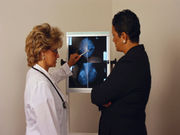For most women, risk of disease in unaffected breast is low, American Society of Breast Surgeons says
MONDAY, Aug. 1, 2016 (HealthDay News) — Contralateral prophylactic mastectomy should generally be discouraged in average-risk women, whose chances of developing breast cancer in the healthy breast are only 0.1 to 0.6 percent a year, according to a new American Society of Breast Surgeons position statement published online July 28 in the Annals of Surgical Oncology.
One group at high risk, for whom the surgery might be warranted, includes women with BRCA1 or BRCA2 gene mutations. According to the guidelines, other women who may opt for contralateral prophylactic mastectomy are those with a lifetime breast cancer risk greater than 25 percent who have not had genetic testing, or those who received mantle radiation before age 30. The surgery may also be appropriate for women with other genetic risks, a strong family history of breast cancer, dense breasts, extreme disease-related anxiety, or concerns about breast reconstruction symmetry.
Surgeons should make a clear recommendation for or against the surgery from a medical standpoint to each patient, the authors said. However, patients’ values and preferences should also be an important part of a shared decision-making process.
“The society believes that a final treatment plan should be based largely on an analysis of the risks and benefits of contralateral mastectomy, and the patient’s perspective on surgery,” senior author Julie Margenthaler, M.D., a professor in the division of general surgery at the Washington University School of Medicine in St. Louis, said in a news release from the American Society of Breast Surgeons. “Patient education on those risks and benefits, all treatment options, and recurrence risks are crucial. A well-planned patient-surgeon discussion to facilitate this is extremely important.”
Full Text 1
Full Text 2
Copyright © 2016 HealthDay. All rights reserved.








